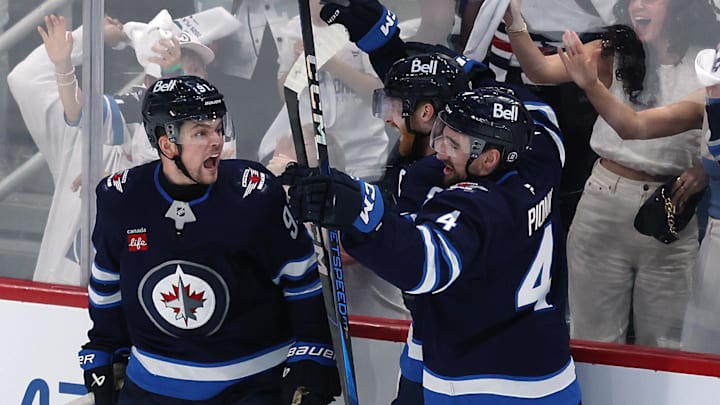The Winnipeg Jets struggled to find consistency in a hard-fought Round 1 series against the St. Louis Blues but thanks to overtime heroics in Game 7, the Jets will leave their missteps in the past and bring a new level of competition in the Round 2 matchup against the Dallas Stars.
In the face of certain defeat, the Jets did the impossible. With two goals in the final two minutes, including the latest tying goal in a Game 7 in NHL history, Cole Perfetti scored just 1.6 seconds away from elimination to tie the Blues and send the game to overtime.
It took over 36 extra minutes and two overtime periods before Adam Lowry and the Jets were able to find the back of the net in double OT, defeating the Blues 4-3 in the most exhilarating game of the playoffs thus far.
Winnipeg now has two days of rest before hosting the Stars in Game 1 on Wednesday, and the questions are swirling. Namely, will the team head into Round 2 looking like the Game 7 winners we saw Sunday night, or the out-scored and out-played squad from earlier in the series?
What almost became an epic collapse against the Blues is now in the rearview mirror, and the Jets are going to put up a strong fight to make it to their first Conference Finals since 2018. There are a few key areas that, if Winnipeg can carry over or even improve their performance, could be difference makers against the Stars.
Continue to control puck possession
Although the Jets looked a step behind the Blues at times in terms of the eye test, numbers from Natural Stat Trick reveal that their puck possession at 5-on-5 was actually pretty solid.
Winnipeg recorded an overall Corsi for of 52.9% at 5-on-5, taking a majority of shot attempts throughout the series. They had the edge in that category during five of seven games played, including the series-clinching victory on Sunday.
Despite generally getting more shot opportunities, the Jets still managed to be outscored by a whopping 21-12 at even strength. Part of this comes down to the lack of conversion on the chances that were generated. After all, Winnipeg generated more overall scoring chances 5v5 with 15 more than the Blues, as well as 8 more high-danger chances.
But St. Louis was able to convert on lower quality chances in a much more effective way, outscoring Winnipeg 10-3 in terms of medium- and low-quality goals. (That could also be a goaltending issue, but we'll get to that later.)
A big part of the discrepancy between puck possession and goals against lies in sloppy plays leading to turnovers. Look no further than Game 7. In the dying seconds of the second frame, Nikolaj Ehlers overskated a pass from Luke Schenn at the St. Louis blueline, where Nathan Walker was able to snatch the puck and go the other way for Radek Faksa's 3-1 goal.
Even going back to Game 6, a lazy clearing attempt from Schenn in the defensive zone didn't even make it to center ice before Faksa jumped on the puck along the boards and sprung Alexey Toropchenko for the goal that made it 5-1.
Winnipeg has actually recorded the third-mosts giveaways of any team this postseason with 101 -- but the Stars are right there with them in fourth place with 89 turnovers.
All things considered, the Jets' stats are still significantly better than the Stars' numbers; the Avalanche were commanding at 5-on-5 with a better Corsi for in all but one game. In fact, Dallas holds the worst CF% of any team from the first round, win or lose, at just 41.4%.
With the way the Jets handled the puck at even strength in Round 1, cleaning up the misplays would make a world of difference on both sides of the ice. Especially given the way Winnipeg rallied in Game 7, recording 34 shots during the third period and the overtime frames, the goals will just keep coming if they can harness that same style of play. The Stars have proven to struggle with hanging onto the puck, so the Jets will need to take advantage of that and be aggressive offensively.
